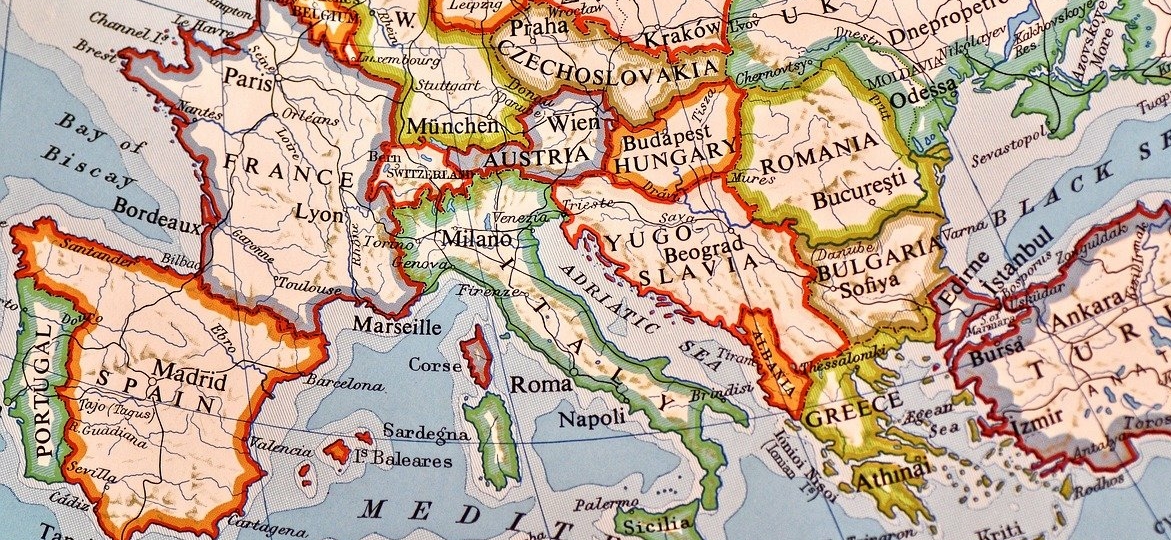You have always wanted to learn French but you don’t know where to begin? Even though a lot of people make it seem like French is a difficult language to learn and speak, it is in fact not that hard to learn. If you can master the basics of the language of Molière it will be even easier to become fully fluent. In today’s new post, GlobalExam will teach you how to learn French, even if you’re a beginner.
Here’s how:
- Why is it important to learn French and where to start
- Learn some basic vocabulary words and grammar rules
- Focus on listening and reading
- Train everyday: consistency is key
- Improve your French skills online with General Français:
Now without further ado, let’s get into it!
Why is it important to start learning French?
You want to learn French, but do you really know why it is important to know French and what are the main reasons to learn it? Sure it is a beautiful language but did you know that it is a very important language throughout the world too? French is spoken on all five continents, with millions of speakers all around the Globe: still undecided between French or Spanish?
Career wise, it is highly valued to speak another language. A lot of recruiters are looking for bilingual people: it helps their company by making international relationships and exchanges easier. If you’re not working yet, then knowing French is very important for studies too. There are a lot of international schools throughout the world and French is present in so many countries that you can easily study wherever you want to. You can even just travel the world if you’re more of a tourist! There are so many beautiful things to discover in French speaking countries.

Where to start if you want to learn French ?
Wanting to learn French is a great decision, but actually doing it is another problem. So, how long does it take to learn it? How long does it take to become fluent? More importantly, where to start?
Don’t worry, it’s very easy, start by the basics of the basics: the alphabet and vocabulary. Every language has a different alphabet, so make sure you start with that. Learn the letters and their pronunciation. The French and English alphabets are the same but they have a very different pronunciation, although some letters are quite similar. This is a nice start.
Then, start with something else you can find in every language: vocabulary. You can start by looking for the most common words there are and learn them, compare them to your native language. Look for greeting words, numbers, animals etc. they’re usually the easiest to learn and remember. Don’t forget to also study basic grammar rules and to practice every day!
#1 Learn some basic vocabulary words to communicate.
In this section, you will find the most common and easy to learn vocabulary words, to help you get started and also good to learn French for children.
Alphabet
Just like we mentioned let’s start with the alphabet.
| French Alphabet |
|---|
| a A |
| b B |
| c C |
| d D |
| e E |
| f F |
| g G |
| h H |
| i I |
| j J |
| k K |
| l L |
| m M |
| n N |
| o O |
| p P |
| q Q |
| r R |
| s S |
| t T |
| u U |
| v V |
| w W |
| x X |
| y Y |
| z Z |
Numbers
Then, some numbers.
| Number in figures | Number in letters |
|---|---|
| 0 | zéro |
| 1 | un |
| 2 | deux |
| 3 | trois |
| 4 | quatre |
| 5 | cinq |
| 6 | six |
| 7 | sept |
| 8 | huit |
| 9 | neuf |
| 10 | dix |
| 11 | onze |
| 12 | douze |
| 13 | treize |
| 14 | quatorze |
| 15 | quinze |
| 16 | seize |
| 17 | dix-sept |
| 18 | dix-huit |
| 19 | dix-neuf |
| 20 | vingt |
| 30 | trente |
| 40 | quarante |
| 50 | cinquante |
| 60 | soixante |
| 70 | soixante-dix |
| 80 | quatre-vingt |
| 90 | quatre-vingt-dix |
| 100 | cent |
| 1000 | mille |
Formules de salutation et pour se présenter
Here are some common greetings and questions to ask someone new.
| Word/expression in French | In English |
|---|---|
| Bonjour | Hello |
| Bonsoir | Good evening |
| Salut | Hi |
| Comment ça va? | How are you? |
| Merci | Thank you |
| De rien | You’re welcome |
| Au revoir | Goodbye |
| A plus tard | See you later |
| Enchanté | Nice to meet you |
| D’où viens-tu? | Where are you from? |
| C’est quand ton anniversaire? | When is your birthday? |
| Est-ce que tu parles Français? | Do you speak English? |
| Où vis-tu? | Where do you live? |
Animaux
Animal names are very easy to learn too.
| Word/expression | Example |
|---|---|
| un chat | a cat |
| un chien | a dog |
| un lapin | a rabbit |
| un poisson | a fish |
| un cheval | a horse |
| une vache | a cow |
| un cochon | a pig |
| un lion | a lion |
| un éléphant | an elephant |
| une souris | a mouse |
| une tortue | a turtle |
| un serpent | a snake |
| une araignée | a spider |
| une abeille | a honeybee |
| un requin | a shark |
| une baleine | a whale |
| un oiseau | a bird |
| un papillon | a butterfly |
| un loup | a wolf |
Parties du corps
Finally, here are some vocabulary words about the body.
| Word/expression | Example |
|---|---|
| la tête | head |
| les cheveux | hair |
| les dents | teeth |
| les yeux | eyes |
| la bouche | mouth |
| le nez | nose |
| les oreilles | ears |
| le cou | neck |
| les mains | hands |
| les bras | arms |
| les doigts | fingers |
| les jambes | legs |
| les pieds | feet |
| le corps | body |
| les ongles | nails |
2# Know some basic grammar rules
Now that you’ve seen important vocabulary words, let’s look into the grammar.
Articles
French articles are a bit trickier than English articles. They are just two languages that don’t work the same way and once you’ve learned the main differences it will be easier to remember them. For starters, French has genders. There are masculine and feminine articles. You probably already saw that when we saw the section about animal names.
Then, there are definite and indefinite articles. They correspond to THE or A/AN. You can also have quantifiers, articles that help you quantify something, it corresponds to “some of” and are called partitives. Just like in English, there are some contracted forms so be careful of those. You will find a summary chart for French articles right below.
| Articles | Singulier Masculin | Singulier Feminin | Pluriel Neutre |
|---|---|---|---|
| Article définis | le (l’ ) | la (l’ ) | les |
| Article définis | au (à le) du (de le) | à la de la | aux (à les) des (de les) |
| Article indéfinis | un | une | des |
| Articles partitifs | du (de le) de l’ | de la de l’ | des |
Accents
There are 5 diacritics in French : 4 accents and one other symbol. They modify the pronunciation or differentiate one word from another, that have the same looks but have completely different meanings.
They are essential and you have to know them by heart. Here is a chart to help you differentiate them.
| Accent | Name | Can be found on | Example | Traduction |
|---|---|---|---|---|
| ‘ | accent aigu | e | école | school |
| ` | accent grave | a, e, u | près de | close to |
| ^ | accent circonflexe | a, e, i, o, u | tête | head |
| ¨ | accent tréma | e, i, u | maïs | corn |
| ¸ | cédille | c | garçon | boy |
Adjectives
French adjectives (words that describe a noun) are very different from the way English adjectives work, but don’t worry, they’re easy to learn. First, there are masculine and feminine adjectives. Second, there are regular and irregular adjectives (just like in almost every other language). There are two simple rules to follow:
- you always have to agree the endings with the noun’s gender and number.
- The adjective is AFTER the noun: a smart girl / une fille intelligent
Verbs and conjugations
Now, onto verbs and conjugations. Something that is not featured in the English language but that you will find in many others like Spanish or German.
In order to learn verbs, you have to learn the pronouns first. Here there are.
| French | English |
|---|---|
| Je | I |
| Tu | You |
| Il / Elle | He / She |
| Nous | We |
| Vous | You |
| Ils | They |
Next, you have to know that there are three groups (types of verbs) in French:
- The first : verbs of which the infinitive ends with -ER (manger, danser)
- The second : the infinitive ends with -IR (courir, partir)
- The third : the infinitive ends with -RE (boire, faire)
As for the endings while conjugating, each group has its own features:
| Pronoun | conjugation -ER | conjugation -IR | conjugation -RE |
|---|---|---|---|
| Je | e | is | s |
| Tu | es | is | s |
| Il / Elle | e | it | |
| Nous | ons | issons | ons |
| Vous | ez | issez | ez |
| Ils | ent | issent | ent |
(note that these endings are only for the simple present tense)
There are 5 irregular verbs that you should absolutely know because they are some of the most important ones : être, faire, pouvoir, aller and avoir.
#3 Focus on listening and reading rather than other skills
Now that you’ve learned the basics of the French language, how can you train your skills and learn more about it?
Well, you should try to focus on reading and listening when you’re a beginner. This is one of the best tips for learning French easily and you will find the most engaging activities that focus on these skills: YouTube videos, reading a book, listening to an audio book (the best is to do both at the same time), listening to podcasts, songs etc. Basically anything that has sound and a written form.
#4 Train everyday with a teacher or a well guided website
At the beginning of your learning journey, it is a very good choice to learn with someone else. Get all the help that you can, especially if you’re not used to learning languages.
Getting a teacher is your best option, and there are a lot of online solutions that allow you to get certified teachers to help you. Training with us on GlobalExam will give you this opportunity and your learning of French will be way quicker and easier.
Learn French today with the Global General program by GlobalExam
If you’ve liked this article and what you’ve read about the basics of the French language, then GlobalExam has what you’re looking for: an online solution to learn French. Our online training platform, Global General, is meant for beginners as well as intermediate levels. It provides them with a lot of resources and activities in order for them to train a lot of different skills.
If you want to go further in learning the French language, then training with us will give you access to fun and engaging activities, detailed corrections as well as personal trainers that will follow your progress. This program is for all the learners who feel discouraged and need a safe place to progress.
What are you waiting for? Let’s learn French together!



